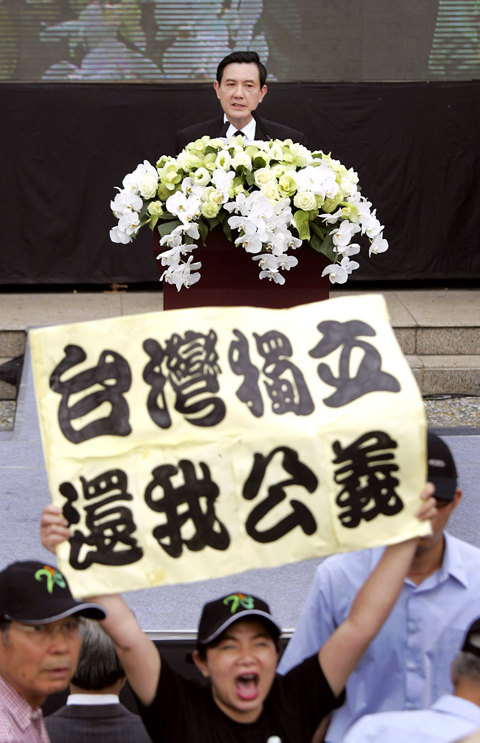Amid tight security and waves of protests, President Ma Ying-jeou (馬英九) attended the central memorial ceremony of the 228 Incident in Kaohsiung yesterday, pledging to seek ethnic reconciliation by finding the truth behind the incident.
Speaking in Hoklo (also known as Taiwanese) to address the ceremony held by the 228 Incident Memorial Foundation, Ma promised to listen to the voices of the 228 victims and their families with humility, unfreeze the budget for the 228 Memorial Foundation and continue to seek the truth for the sake of the families.
DISTURBANCE

PHOTO: AP
Several protesters stood up on their chairs in the seating area and unfurled protest banners that read “Formosa Independence” and chanted protest slogans while Ma was giving the speech. A group of protesters also shouted “Ma Ying-jeou, step down” outside the site.
Continuing his speech amid the loud protest, Ma said he understood the disapproval of some families of 228 victims and said he had been consistent with efforts to reveal the truth about the incident and see it through the eyes of the victims’ families.
“No apologies or compensation can bring back the lives of the victims ... The government should be compassionate because our power comes from the people, and we must listen to the people’s voices with humility,” Ma said at the ceremony held at the Kaohsiung Museum of History.
Ma pledged to defend democracy in Taiwan and promised to carry out his election campaign promise of establishing a national 228 Memorial Museum and supporting the operation of the 228 Memorial Foundation despite the legislature’s move to cancel its NT$300 million (US$8.6 million) budget this year. Ma said he would establish a regulation to push for the establishment of the museum and allocate an annual budget of NT$300 million to continue funding the foundation.
HISTORY
The 228 Incident refers to a massacre that began on Feb. 27, 1947, when Chinese Nationalist Party (KMT) troops suppressed an anti-government uprising, leaving tens of thousands dead, missing or imprisoned. The event was a precursor to the White Terror era in Taiwan.
Democratic Progressive Party Chairperson Tsai Ing-wen (蔡英文) also attended the ceremony, but did not interact with Ma.
APOLOGY
Chen Chin-huang (陳錦煌), the head of the foundation, later apologized for failing to prevent disturbances during the ceremony.
“We had planned to hold the ceremony in a peaceful and introspective atmosphere,” he said. “The protest disturbed the activity and was not respectful to the 228 victims.”
Ma encountered another smaller protest later in the afternoon while attending another 228 Incident memorial ceremony hosted by the Taipei City Government at the Taipei 228 Memorial Park. He ignored the protesting voices throughout the whole event.
“A priest told me that although I do not carry the original sin for the incident, I am responsible for finding out the truth ... I will focus all my efforts to look into the truth and give the justice that the families deserve,” Ma said.
The president later joined Taipei Mayor Hau Lung-bin (郝龍斌) and several members of victims’ families to untie a large white knot above the stage in a gesture of reconciliation among different groups. The guests, however, were unable to untie the knot, creating an awkward moment at the end of the ceremony.

US President Donald Trump yesterday announced sweeping "reciprocal tariffs" on US trading partners, including a 32 percent tax on goods from Taiwan that is set to take effect on Wednesday. At a Rose Garden event, Trump declared a 10 percent baseline tax on imports from all countries, with the White House saying it would take effect on Saturday. Countries with larger trade surpluses with the US would face higher duties beginning on Wednesday, including Taiwan (32 percent), China (34 percent), Japan (24 percent), South Korea (25 percent), Vietnam (46 percent) and Thailand (36 percent). Canada and Mexico, the two largest US trading

China's military today said it began joint army, navy and rocket force exercises around Taiwan to "serve as a stern warning and powerful deterrent against Taiwanese independence," calling President William Lai (賴清德) a "parasite." The exercises come after Lai called Beijing a "foreign hostile force" last month. More than 10 Chinese military ships approached close to Taiwan's 24 nautical mile (44.4km) contiguous zone this morning and Taiwan sent its own warships to respond, two senior Taiwanese officials said. Taiwan has not yet detected any live fire by the Chinese military so far, one of the officials said. The drills took place after US Secretary

CHIP EXCEPTION: An official said that an exception for Taiwanese semiconductors would have a limited effect, as most are packaged in third nations before being sold The Executive Yuan yesterday decried US President Donald Trump’s 32 percent tariff on Taiwanese goods announced hours earlier as “unfair,” saying it would lodge a representation with Washington. The Cabinet in a statement described the pledged US tariffs, expected to take effect on Wednesday next week, as “deeply unreasonable” and “highly regrettable.” Cabinet spokeswoman Michelle Lee (李慧芝) said that the government would “lodge a solemn representation” with the US Trade Representative and continue negotiating with Washington to “ensure the interests of our nation and industries.” Trump at a news conference in Washington on Wednesday announced a 10 percent baseline tariff on most goods

THUGGISH BEHAVIOR: Encouraging people to report independence supporters is another intimidation tactic that threatens cross-strait peace, the state department said China setting up an online system for reporting “Taiwanese independence” advocates is an “irresponsible and reprehensible” act, a US government spokesperson said on Friday. “China’s call for private individuals to report on alleged ‘persecution or suppression’ by supposed ‘Taiwan independence henchmen and accomplices’ is irresponsible and reprehensible,” an unnamed US Department of State spokesperson told the Central News Agency in an e-mail. The move is part of Beijing’s “intimidation campaign” against Taiwan and its supporters, and is “threatening free speech around the world, destabilizing the Indo-Pacific region, and deliberately eroding the cross-strait status quo,” the spokesperson said. The Chinese Communist Party’s “threats